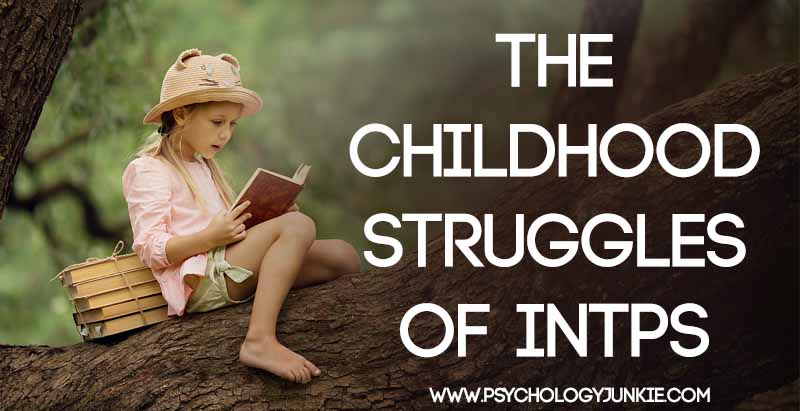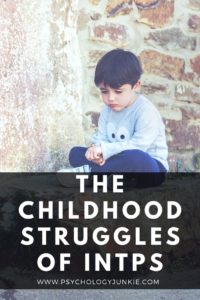The Childhood Struggles of INTPs
“The only fence against the world is a thorough knowledge of it.”
– John Locke, a rumored INTP
INTP children are known for their ingenuity, imagination, and their endless need to make sense of the world around them. They are a rare breed, making up only 3% of the US population. As such it is rare for them to find other individuals who understand them or process things the same way they do. While all children go through a “why” phase, the INTPs entire life seems to revolve around “why.” Why are we here? Why do people believe in God? Why don’t people believe in God? Why do we have to go to school? Why can’t we learn on our own? More than anything, INTPs want to understand the nature and logic of everything around them. This desire for knowledge is fueled by an intuition that leads them down numerous theoretical pathways that are unique and often uncharted.
Not sure what your personality type is? Take our new personality questionnaire here. Or you can take the official MBTI® here.
But what unique struggles do INTP children face in the world? That’s what this post aims to address.
Table of contents
Estimated reading time: 7 minutes

Misunderstood Curiosity
INTPs are insatiably curious and rarely accept anything at face value. If someone gives them a rule they have to know why the rule exists and whether or not that rule is grounded in logic. They tend to be skeptical of rules and anything that seems to be based on tradition rather than logic. If a parent or teacher tells them to do something “because I said so” or because “that’s just the way it’s done” they will certainly need to be prepared for further convincing and logical appeals.
The curiosity of young INTPs is often stifled by parents who get tired of answering questions or who merely have no interest in figuring out answers. I’ve heard from many INTPs who were restricted from asking questions and were told more or less that “children are to be seen and not heard.” This can create a lot of anxiety and stress for young INTPs as they essentially have to suppress a major part of who they are as people.
You can read more about this in Is Arguing Your Child’s Learning Style?
Expectations
INTPs have a strong internal set of standards that they strive to reach. They care about being logical, being fair, and pursuing their independent interests. Far less important is what a report card says or what teachers think about their performance. For this reason, they may seem like chronic underachievers. Parents can often tell that they’re smart, but they don’t see it always translating into good grades. INTPs hate repetition and routine and unfortunately for them, much of the elementary school years revolve around those two things. Reciting off times tables and memorizing lists of facts are hardly interesting to them so many young INTPs let their minds wander to other more fascinating subjects.
Teachers who think outside the box and keep classes challenging can pique the curiosity of the INTP child, which is extremely motivating to them. They are drawn to new and novel ideas and mental challenges so they are quite capable of doing well if they are properly motivated. If unmotivated, however, they won’t particularly care about proving their aptitude to anyone besides themselves. It isn’t until they take standardized tests that people are quite able to see how intelligent they tend to be. They routinely perform extremely well on the SATs and also have the second-highest IQ of any of the types according to the MBTI® Manual.
Emotions
Young INTPs tend to struggle with navigating the emotional world of their friends and family members. They prefer the world of logic over the world of feelings and struggle to understand the emotional needs and sensitivities of others. They may be unintentionally cold and direct in their assessments and then be confused or embarrassed when they realize they have hurt someone’s feelings or made them uncomfortable. INTPs do care about their relationships as much as the next person, but because they have inferior Extraverted Feeling (Fe) they aren’t quite sure how to put their feelings into words and they struggle with reading emotional cues. This can be a source of insecurity and confusion for them as they grow up and many of them decide to keep their feelings under wraps. This can frustrate more emotional, feeling-driven parents who see the lack of emotional expression as a “cold shoulder”. They may push their child to be more affectionate, more verbally demonstrative or expressive. This can create a lot of stress for the young INTP who feels out of their depth when pushed in this manner. Many young INTPs would rather receive a letter acknowledging a parent’s love than have to respond right away to verbal demonstrations. They can feel “put on the spot” when emotional displays are made, but when they receive a letter they can consider their own responses and enjoy their emotions privately without worry.
Controlling Environments
Young INTPs crave independence and autonomy and will feel trapped in a controlling environment. They often love to get out on their bikes and explore the far reaches of their town. They enjoy being alone and reading books, listening to music, drawing, creating, taking things apart and putting them back together. Helicopter parents or parents with strict household guidelines and structures can be a great source of stress to them. If they’re not given adequate alone time or freedom or chances to prove their competence they can get depressed and overwhelmed. It’s important that they are given alone time each day to pursue their own independent interests and that they be given responsibilities and opportunities to prove their maturity and capability at taking care of themselves.
Inattentive Parents
While smothering, controlling parents are difficult for young INTPs to deal with, parents who simply don’t take the time to notice them are also a source of pain. INTPs are usually reluctant to express their fears, insecurities, and worries, but this doesn’t mean they don’t have them. Many parents see the quiet, reserved nature of the INTP and just assume that if there’s a problem they will speak up. They get busy with their own lives and the child starts to fade into the background. If the child has more outspoken siblings they make take the limelight on such a regular basis that the young INTP feels invisible. It’s extremely important for parents to pay attention to their children, each of them. They can promote a better relationship with their child by making themselves available; many INTPs enjoy going on car rides, listening to music, or just being able to work alongside their parents in a non-pressurized way. When they do decide to talk it’s important for parents to listen intently and patiently and not jump in with a lot of advice and chatter right away. If parents can prove that they’re available for them, understanding of them, and accepting of them, young INTPs will feel much more able to share their concerns and ask for advice.
In Conclusion…
Young INTPs have an enormous amount of potential and ability. They are often intelligent, innovative, and curious. Having a good childhood will give them a strong foundation in being able to explore their many ideas and interests. I hope this article has been helpful! Please share any thoughts you might have in the comments!
Find out more about your personality type in our eBook, Discovering You: Unlocking the Power of Personality Type.

Other Articles You Might Enjoy:
10 Things You Should Never Say to an INTP
This article contains affiliate links. I only recommend products I truly believe in.

Get Your Free eBook!

Subscribe to our newsletter and get an eBook packed with powerful parenting tips for each personality type! Enjoy 28 beautifully illustrated pages exploring the needs and strengths of all 16 personality types in childhood.








Some of your articles about children should be mandatory for some parents, teachers ans psy. In France, the MBTI is not popular in the intellectual world (like everything that comes from the United States). But basically, regardless of the letters, these articles sensitize to the intrinsic differences that exist between each child.
Reading this makes me love my parents ever more, for pretty much nailing my upbringing as an INTP most of the time. I’m going to make sure to say that to my mom.
My enmeshing INFP mom and neglectful ENTP dad did harm in some ways, but I will be forever grateful for the fact that I was home schooled with little structure from 1st-5th.
“While smothering, controlling parents are difficult for young INTPs to deal with, parents who simply don’t take the time to notice them are also a source of pain. INTPs are usually reluctant to express their fears, insecurities, and worries, but this doesn’t mean they don’t have them. Many parents see the quiet, reserved nature of the INTP and just assume that if there’s a problem they will speak up. They get busy with their own lives and the child starts to fade into the background. If the child has more outspoken siblings they make take the limelight on such a regular basis that the young INTP feels invisible. It’s extremely important for parents to pay attention to their children, each of them. They can promote a better relationship with their child by making themselves available; many INTPs enjoy going on car rides, listening to music, or just being able to work alongside their parents in a non-pressurized way. When they do decide to talk it’s important for parents to listen intently and patiently and not jump in with a lot of advice and chatter right away. If parents can prove that they’re available for them, understanding of them, and accepting of them, young INTPs will feel much more able to share their concerns and ask for advice.”
This is especially true for me.
My parents saw a good normal child who performed well in school, whose only concern was to get more books to read, songs to listen, crayons to draw with, and left me mostly to my own devices.
They only pay attention to my grades, or when I am fed up enough to lash out against them.
In hindsight, I must’ve learned everything I need from the encyclopedia and not from my own father and mother. They did give me freedom to explore, but sometimes I wish for them to explain what I couldn’t understand from books alone. Sometimes I wish they’d have read my books with me.
This is such an accurate depiction of what my childhood was like, and I’m so grateful I had parents that took the time to understand my needs.
That’s so wonderful! So many INTPs are misunderstood, I’m really glad your parents were open to understanding you better 🙂
“third highest IQ”
I would like the source for this, since most of the studies I’v read put INTP and INTJ first not third, and it also depends on the sample group used. Some studies put INTP first others INTP, but mostly it was INTP from what I’ve gathered. Some extra source to balance out my views would be nice. Thanks in advance.
Sure! The source I’m using is the MBTI® Manual – Third Edition. Page 269 has a comparison of types and IQ scores as well as grades. You actually have found an error, though! Looking at the manual now I see that I misread the graph. INTPs have the third-highest grades in High-School and the second-highest IQ score. I must have mistakenly looked at the graph for grades instead of IQ when I wrote this. So I will fix that now!
This is so me it’s not even funny! I could go on and on. In fact, i was going on and on; literally writing in detail my life story, before I realized I was going on and on. So INTP. LOL. Suffice it to say, I was raised and have been exposed to a variety of “unique” (aka narcissistic & borderline, bipolar, anxious, etc.) types in my day and I’ve had this unquenchable curiosity to try to explain why. Even after already thinking i’ve “figured it out”. I’m always searching for the meaning in things, the relationship between things, the cause and effect, action/reaction, yin/yang. I scour the web researching my ideas to supplement my own theories based on logic and sound, unbiased and vigilant observation. I am always trying to explain my upbringing and really just why people and society act they way they do. Maybe not all that different than Jung.
It’s so like most of us!
I am one of the unhealthy INTP type, and my life feels like a dissaster. Is tgere anything i can do fix my mess or improvise forward towards the healthy type signs
That part about emotions is really true. To my friends and family I often came out as cold, so sometimes I noticed I started to remind myself, like: “I’m supposed to play dumb/surprised/emotional now.” When in reality, I usualy predict what people’s reaction will be and prepare for it in advance. And people think I’m weird because I don’t react according to their expectations. With my “predictions”, even books and movies became boring – I usually know how everything will end so it’s meaningless to keep watching.
And that parent part: “because I said so” and “that’s just the way it is” is so true! When I was young I would keep asking questions about stuff that took my parents too much time to explain (like: “Why is the moon bright?”, ”Why do we get tired?” and ”How did the Tooth fairy knew when my tooth fell out?”). These questions made sense to me, but I would get extremly irritated when my friend would ask the teacher: “How do I know that one and one is two?”
This is way too true, You know it would have been much better if my family would believe this, or if my mom would just read this. Which didn’t happen, I think you can guess why.
I completely agree. I also wish my parents had read this.
I completely agree.
It’s actually quite easy to deal with controlling
parents
Just ask them this: “What matters to you more (Manners and being polite or The truth
and what’s right)”
Then explain the difference between the four
As and INTP, I struggled with all of these. it’s comforting knowing that there are other people like me.
It’s strange to think that anyone actually had the same struggles as me. I agree with this a bit too much. My mom would never read this she thinks this is a waste of time. 😶
I completely agree.
It was really weird reading something so recognizable, many parts of which I hadn’t thought about for years! Very impressive article, thank you for this!
Only some of this rings true for me. I’m supposed to be an INTP (makes more sense than other types) but I was never one to buck the rules or question authority as a child, as I wanted my teachers to like me. Rules were a comfort in a sense as I could know what was expected, what I was “supposed” to do, which I suppose removed a lot of the guesswork that would otherwise have been overwhelming (or embarrassing). I also cared a lot about grades, not for the approval of others but for my own satisfaction and sense of worth. Sometimes it was frustrating when adults didn’t understand my questions. But what I could not stand (and still can’t) was being rushed by my teachers or my parents – in sorting a mess of tangled information, in finishing my work or in making a decision before I’d considered all of the options – anything that would make me fall short of turning out my very best work.